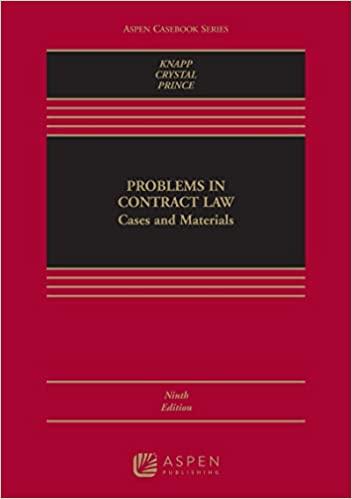Question
The general idea of conflict of laws is dealing with the issue of when there are two sets of laws in place that may govern
The general idea of "conflict of laws" is dealing with the issue of when there are two sets of laws in place that may govern the same issue. For example, if you do business with someone in Arizona, and you then have a legal issue to deal with, you could file the lawsuit in a California STATE court, and Arizona STATE court, or a Federal court in either state. Even if you filed in a federal court, the court would be using state law to interpret the legal issue. Normally, a court in California would apply California law...but under certain circumstances, the court may need to apply Arizona law (say for instance, your contract states that Arizona law will govern the transaction). This gets into complex issues of legal analysis, so I don't want to get too in-depth, but this is the general picture.
In the Mahoney Case, there was a Delaware Corporation, funded by the federal government, operating in Germany(this immediately shows that there might be a conflict - would the laws of Delaware govern or would Federal laws govern or would German/international laws govern?).
Following German tradition, the Corporation entered into an agreement with the German workers to retire at age 65. However, the United States Congress then passed a law in America to protect workers as they aged. This law extended to American workers in Germany (but wouldn't apply to German workers as American law doesn't typically apply to them).
The Corporation applied for an exemption for its American workers from the German Work Council, which was denied (thereby putting the Corporation in the sticky spot of either violating American law or the German Agreement, since the two laws were directly in conflict with each other).
This case is unique because the mandatory retirement at age 65 was not a law by the German government, but was a contractual "collective bargaining" agreement between a worker union and the employer. Normally, there is an exemption if an American law would force a foreign employer to violate the law of the host country, but this was a "contract" issue rather than a German law issue.
Ultimately,the court held that violating the German contract would be illegal in Germany just as violating a German law would be and therefore the court extended the exemption to the company (meaning the American plaintiffs that brought the lawsuit for unlawful termination and violation of theADEA act lost their case).
Do you think an American court would want to, unless there was no other option, tell a corporation to ignore the laws of the country in which they operate? What kind of issues could arise if American courts began advising corporations to violate laws of the nations in which the corporations operate?
Step by Step Solution
There are 3 Steps involved in it
Step: 1

Get Instant Access to Expert-Tailored Solutions
See step-by-step solutions with expert insights and AI powered tools for academic success
Step: 2

Step: 3

Ace Your Homework with AI
Get the answers you need in no time with our AI-driven, step-by-step assistance
Get Started


